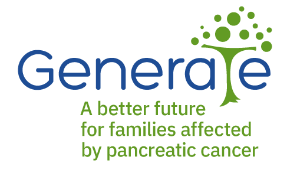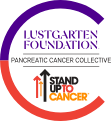How does the GENERATE Study help people?
The study helps families of pancreatic cancer patients get genetic testing. Families may have barriers to testing. These could be:
- A lot of travel to get testing
- Not knowing that cancer risk can be passed down through the family. This means that family members could be at risk.
- The cost of genetic services and/or testing
To help with these barriers, the study:
- Provides genetic education and testing in people’s homes. This happens through the internet and by mailing in a saliva sample.
- Lets a person skip an in-person genetic session before getting genetic testing
- Provides genetic testing at no cost to participants in the study
- Provides information on local genetic counseling and support services to everyone in the study
How much does it cost to be in the GENERATE Study?
There is no cost to be in this study. GENERATE offers genetic testing at no cost to participants in the study. However, consenting to the GENERATE Study does not mean you are required to get genetic testing.
How will you protect my privacy and personal information?
A federal law called HIPAA protects your medical information. The technology used in this study is HIPAA compliant.
We take care to protect your personal information. Study data is in a database protected by a password. The database is on a secure server at Dana-Farber Cancer Institute that only study staff can get to.
Hard copies of the study data will be kept in locked file cabinets that only study staff can get to.
Can I leave the GENERATE Study after I have joined?
Yes, you can leave the study at any time.
What should I do if I have technical issues during the study?
If you have any issues or questions:
- Email us at generate@partners.org or
- Call us at 617-582-9444
Is the GENERATE Study linked to any companies?
GENERATE uses a company called Color Genomics. Color is a certified genetic testing company.
Will the GENERATE Study look at all of my genes?
Color’s Hereditary Cancer Test looks at 30 genes that are related to common cancers that can be passed down in a family. This includes breast, ovarian, colorectal, and prostate cancer.
Who has access to my genetic data?
Color Genomics only shares the genetic test results with the participant and the ordering provider, as well as additional healthcare providers designated by the participant. Additionally, Color Genomics’ internal strict guidelines and access controls ensure data is protected. You have the option of giving Color Genomics permission to store any of your saliva that remains after testing has been completed. Unless you elect the optional sample storage, Color Genomics will retain the saliva only for the maximum duration permitted under applicable law or regulation, after which point it will be destroyed.
Is genetic counseling part of the study?
Yes, genetic counselors (GCs) are professionals who have education in genetics and counseling. They help people understand genetic conditions and provide emotional support.
Everyone in the study can ask GCs questions and can talk to a GC by phone before and after their genetic test. If someone wants to meet with a GC in person, we can give information about local GCs.
What genes is the GENERATE Study interested in?
The study is recruiting families with a germline genetic mutation in one of the following genes: APC, ATM, BRCA1, BRCA2, CDKN2A, EPCAM, MLH1, MSH2, MSH6, PALB2, PMS2, STK11 or TP53.
How do I access cancer screening?
It is possible that some participants will be recommended to get cancer screening based on their genetic test result. Screening costs are not covered by the study and coverage for these services (i.e. mammogram, endoscopy or pancreas screening) would depend on insurance. The study team is happy to provide resources on how to access screening. By participating in the GENERATE Study, you may be invited to participate in future studies involving screening.
What is considered first and second-degree relatives?
First-degree relatives include your parents, children and siblings. Second-degree relatives include your uncles, aunts, nephews, nieces, grandparents, grandchildren and half-siblings.

